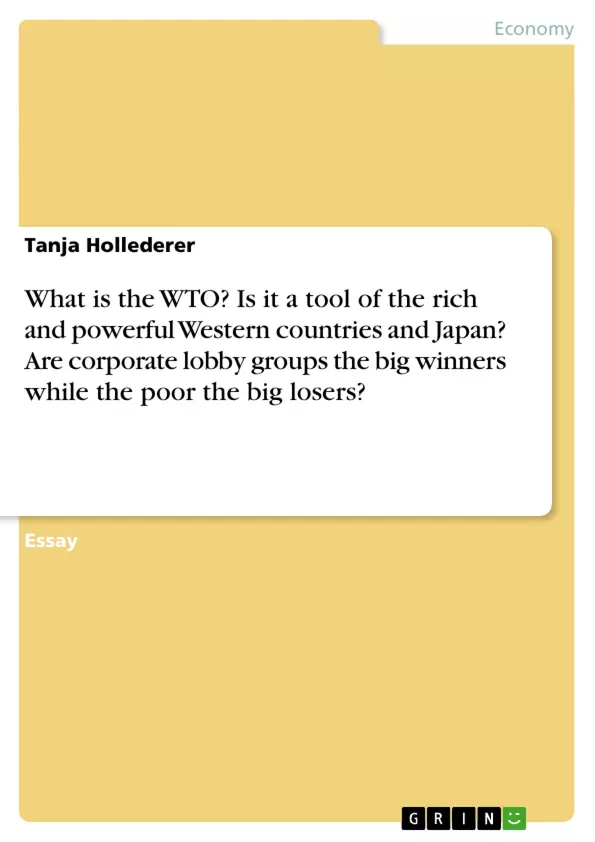Trade is as old as mankind and with mankind it developed and kept growing into a
jungle of arrangements, contracts, and trade relations summarised by the catch phrase
globalisation. Everyone agrees that there have to be rules to form a common
foundation for international trade around the world, so that all countries which use it
as ‘an instrument for promoting development’1 will profit from its many benefits.
The World Trade Organisation (WTO) is the nations’ solution to the problem of
ensuring free and fair trade in the interest of economic development of the world as a
whole. Keeping this in mind, one might wonder why since 1999 a movement called antiglobalisation
wins more and more followers seeing the WTO as their declared
enemy2. Calls for an abolishment of the system grow louder and louder and the
dissatisfaction amongst the more than two thirds of developing member countries
shows in the debacle of Seattle where African ministers simply walked out or the
collapse of trade talks in Cancun. Has the WTO really developed into a mere tool of the rich and powerful Western
countries and Japan and are corporate lobby groups the big winners, while the poor
the big losers? This question forms the centre of the following explanations, which
shortly outline the original idea behind the WTO, then concentrate on the problems
of implementing this idea, and finally answer the question in a conclusion. Due to the
limitations of this essay it is not possible to cover everything associated with the
WTO. The texts indicated as footnotes should be considered for further exploration.
1 Nitya Nanda, WTO and Development, It’s all about a mercantilist game. From: http://www.gdnet.org/ 2 See The Guardian/Action Aid, TRADE: An insight into the way the world does business, 8 September 2003; p. 3.
Inhaltsverzeichnis (Table of Contents)
- Introduction
- A critical view of the WTO
- The cases of agriculture and intellectual property rights
- Conclusion
Zielsetzung und Themenschwerpunkte (Objectives and Key Themes)
This essay explores the complexities of the World Trade Organization (WTO) and its impact on global trade, particularly regarding its perceived bias towards developed countries. The text analyzes the potential for the WTO to be a tool for economic development, while also highlighting the criticism surrounding its implementation and potential disadvantages for developing nations.
- The WTO's role in promoting free and fair trade for global economic development
- Criticism of the WTO's decision-making process and the influence of powerful countries
- The effectiveness of the WTO's dispute settlement system in addressing trade disputes
- The impact of WTO agreements on developing countries and potential for exploitation
- The argument of free trade leading to development and its application in practice
Zusammenfassung der Kapitel (Chapter Summaries)
- Introduction: This chapter introduces the concept of globalization and the need for rules governing international trade. It discusses the WTO's role in promoting free and fair trade for the economic development of all nations, highlighting the growing anti-globalization movement and its criticism of the WTO.
- A critical view of the WTO: This chapter examines the principles underlying the WTO, including the aim to reduce trade barriers and promote non-discriminatory trade. It analyzes the criticism directed towards the implementation of these principles, particularly focusing on accusations that developed countries exploit the WTO to benefit at the expense of developing nations.
Schlüsselwörter (Keywords)
Key themes and concepts in this essay include globalization, international trade, the World Trade Organization (WTO), free trade, economic development, developing countries, developed countries, dispute settlement system, and the influence of powerful countries. The text also delves into the impact of WTO agreements on agriculture and intellectual property rights.
Frequently Asked Questions: Is the WTO fair?
What is the primary mission of the WTO?
The World Trade Organisation (WTO) aims to ensure free and fair trade to promote economic development globally.
Why is there an anti-globalization movement against the WTO?
Critics argue that the WTO has become a tool for rich Western nations and Japan, favoring corporate interests over the needs of developing countries.
How do developing countries react to WTO policies?
Dissatisfaction is high, as seen in events like the Seattle protests and the collapse of trade talks in Cancun, where developing nations felt their interests were ignored.
What roles do agriculture and intellectual property play?
These are key areas of conflict where developed nations are often accused of maintaining barriers or rules that disadvantage the poor.
Does free trade always lead to development?
The essay questions this assumption, analyzing whether the implementation of WTO rules actually benefits all member countries equally.
- Citation du texte
- Tanja Hollederer (Auteur), 2005, What is the WTO? Is it a tool of the rich and powerful Western countries and Japan? Are corporate lobby groups the big winners while the poor the big losers?, Munich, GRIN Verlag, https://www.grin.com/document/44216



